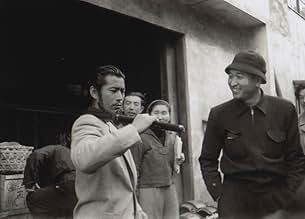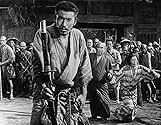Adicionar um enredo no seu idiomaA feature-length documentary about the life and films of legendary actor Toshiro Mifune, weaving together film clips, archival stills, and interviews with such luminaries as Steven Spielberg... Ler tudoA feature-length documentary about the life and films of legendary actor Toshiro Mifune, weaving together film clips, archival stills, and interviews with such luminaries as Steven Spielberg and Martin Scorsese. Narrated by Keanu Reeves.A feature-length documentary about the life and films of legendary actor Toshiro Mifune, weaving together film clips, archival stills, and interviews with such luminaries as Steven Spielberg and Martin Scorsese. Narrated by Keanu Reeves.
- Direção
- Roteiristas
- Artistas
- Prêmios
- 3 indicações no total
- Self
- (as Tadao Sato)
- Direção
- Roteiristas
- Elenco e equipe completos
- Produção, bilheteria e muito mais no IMDbPro
Avaliações em destaque
The documentary clocks in under 80 minutes to tell the story of an actor who made hundreds of films and influenced a century of different generations of actors from around the world. The testimonials are superficial, precious sources are wasted and long minutes are spent on side stories that have nothing to do with Mifune. Of the actor's eighteen films with Kurosawa, Okazaki chose four or five to detail and nothing was said that has not already been known to exhaustion by any movie buff. Even the chosen scenes are wrong. When the subject is Rashōmon or Shichinin no Samurai, no spoken scenes are shown, of Mifune. None. When we get to Kumonosu-jō, a whole sequence is spent for a supporting actor to reminisce of his own scene, and another one is to let us know that the extraordinary arrows scene was filmed without Kurosawa having made any life insurance for the actors. Very interesting. As detail. But nothing more is said about this exquisite work by Mifune and Isuzu Yamada. Actresses such as Kyôko Kagawa and Yôko Tsukasa, who worked several times with Mifune and could have told fantastic stories of both his creative process and his idiosyncrasies, remained in the shallow, in the anecdote. Director's fault.
It is remembered that "The Magnificent Seven" is a remake of Shichinin no Samurai and that "A Fistful of Dollars" is a remake of Yojimbo. But not a word is said about "The Outrage," directed by Martin Ritt in 1964, being a remake of Rashōmon with Paul Newman and Claire Bloom. No new insight into Mifune and Kurosawa's breakup. And once the partnership is over, Okazaki rushes it to the end, even though Mifune had at least twenty years of active life in films and television after his last work with Kurosawa.
For the nerd audience, George Lucas is an unforgivable (and inexplicable) absence, since it is known and confirmed the influence that Kakushi-toride no san-akunin, of 1958, had on the whole conception of the Star Wars saga. Also known is the fact that Mifune was asked to play Obi-Wan Kenobi and turned it down on the advice of his dorky business manager. It is said in Star Wars trivia that even Darth Vader's helmet was based on Mifune's helmets in his samurai films.
Moreover, not a single Mifune interview. No TV shows, no attendance at awards or events. Mifune was a withdrawn and private man. It would have been invaluable to see him talk about his own life and career. Deconstruct the myth and show his humanity. The director should have panned out every scene in which Mifune offered a piece to help unravel the puzzle of his personality. As it was edited, the documentary is about an eighteenth-century figure. There are no voice records, there are no quotes or statements.
It's a pity.
Toshiro Mifune (1920-1997) was a notable Japanese actor who appeared in more than 150 feature films. Throughout his lifetime he achieved more worldwide fame than any other Japanese actor of the 20th century.
Through stills, archival footage, and interviews - This "Last Samurai" documentary takes a close-up look at the life and career of Toshiro Mifune.
I should point out that if you want a more biographical look at the man, this may not completely satisfy you. You do learn about his life but I never exactly felt like I truly knew the man as I watched. Instead, it's much more of a filmography and as such highlighted his very best films and discussed them and their impact as well as how Mifune was able to make the most in his performances. In fact, when you do learn personal information, it's mostly negative, such as his very heavy drinking and marital infidelity. I would have loved to hear more from his son, Shiro, in order to learn more about who Toshirô really was off camera. Shiro is featured .but I wanted to hear much more. In addition to interviews with the son, you hear from many actors who worked with him as well as from American directors like Spielberg and Scorsese! Wow you wonder how Okazaki was able to get all this great contributors!
Overall, this is a very well crafted film with lots of beautiful film clips, excellent graphics and editing and is really a must-see for anyone interested in international cinema. It's also a must-see for anyone who loves the films of Akira Kurosawa, as many of their best films were collaborations and are discussed in detail in this lovely documentary.
Você sabia?
- CuriosidadesHisao Kurosawa helped make this documentary. He is the son of legendary director Akira Kurosawa, who often collaborated with Toshirô Mifune.
- Citações
Shirô Mifune: It was his compassion that made him rebellious.
- ConexõesReferenced in Um Filme de Verão! (2020)
- Trilhas sonorasInfra 4
Composed by Max Richter
Performed by Louisa Fuller, Natalia Bonner, Nick Barr, Ian Burdge, Chris Worsey
Courtesy of Deutsche Grammophon GmbH, Hamburg
Under license from Universal Music Enterprises
Principais escolhas
- How long is Mifune: The Last Samurai?Fornecido pela Alexa
Detalhes
Bilheteria
- Faturamento bruto nos EUA e Canadá
- US$ 62.279
- Fim de semana de estreia nos EUA e Canadá
- US$ 4.296
- 27 de nov. de 2016
- Faturamento bruto mundial
- US$ 62.279
- Tempo de duração1 hora 20 minutos
- Cor
- Proporção
- 1.66 : 1
- 2.35 : 1
Contribua para esta página
































